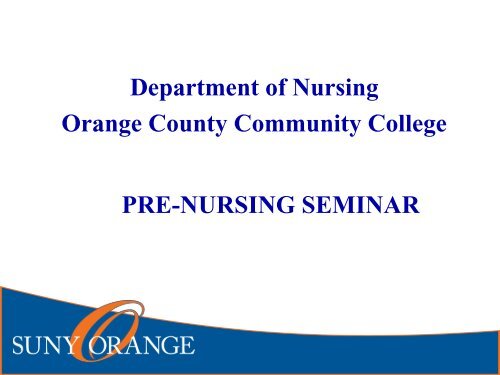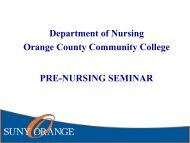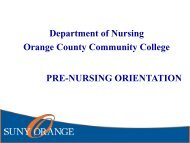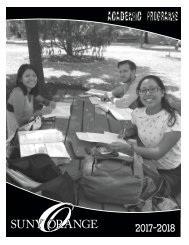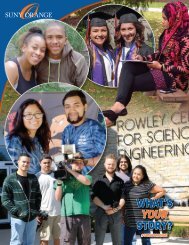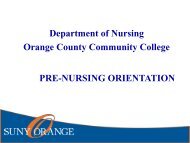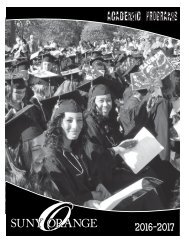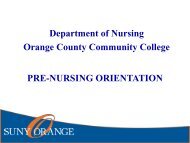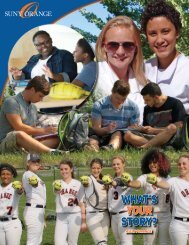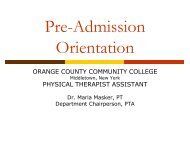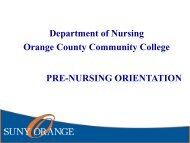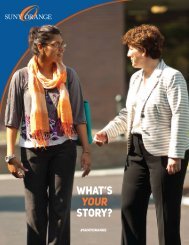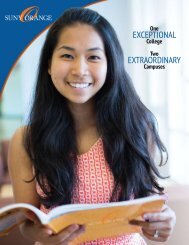Pre-Admissions Nursing Orientation - Fall 2019
Pre-Admissions Nursing Orientation - Fall 2019
Pre-Admissions Nursing Orientation - Fall 2019
Create successful ePaper yourself
Turn your PDF publications into a flip-book with our unique Google optimized e-Paper software.
Department of <strong>Nursing</strong><br />
Orange County Community College<br />
PRE-NURSING SEMINAR
WELCOME<br />
Completion of this online nursing department<br />
seminar is a part of the eligibility requirements that<br />
must be completed prior to submitting a <strong>Nursing</strong><br />
Program application at SUNY Orange.
This power point presentation is an overview of<br />
the Associate Degree <strong>Nursing</strong> Program offered at<br />
SUNY Orange Middletown and Newburgh<br />
Campuses, and highlights important policies and<br />
procedures as outlined in our Document of<br />
<strong>Nursing</strong> Student Policy.<br />
This program of study must be completed along<br />
with the post test. After completion of the power<br />
point you will receive a certificate which is to be<br />
printed and provided to the <strong>Admissions</strong><br />
Department.
INTRODUCTION<br />
• This Power Point presentation highlights the policies and<br />
regulations specific to the nursing program and supplements the<br />
general college policies for students. They strengthen the nursing<br />
program’s goal to educate nurses who are knowledgeable and<br />
responsible in nursing practice.<br />
• The nursing faculty developed this power point to fulfill several<br />
other purposes. It designates the polices and defines specific<br />
regulations governing students in the nursing program; helps<br />
assure that students will receive consistent and uniform<br />
consideration throughout the program; and serves as a guideline for<br />
nursing students.
INTRODUCTION<br />
• These policies and regulations also are in accordance with several<br />
other principles, codes and laws with which nurses and nursing<br />
students must comply. Unsafe, unethical, or disruptive behavior in<br />
the classroom or clinical setting is not only socially unacceptable,<br />
but it is not professionally permitted. Refer to your SUNY Orange<br />
Student Handbook booklet.<br />
• All students will be expected to indicate, by reading of this power<br />
point and submission of the certificate of completion to the<br />
<strong>Admissions</strong> Department, their intent to abide by the policies as set<br />
forth. Each student will receive a hard copy of the most updated<br />
version of the Document of <strong>Nursing</strong> Student Policy upon<br />
beginning <strong>Nursing</strong> classes and each subsequent semester while<br />
enrolled.
INTRODUCTION<br />
• You are responsible for the information in this presentation,<br />
which reflects information contained in the Document of<br />
<strong>Nursing</strong> Student Policy (also known as the Pink Policy Book).<br />
• By completing and signing the certificate at the end of the<br />
presentation you understand that you are responsible for<br />
abiding by the contents.<br />
• The certificate is valid for two years.
Program Description<br />
• The Associate in Applied Science (AAS) degree program in nursing<br />
prepares students to become registered professional nurses.<br />
• It provides for the development of those competencies expected of<br />
registered nurses in general nursing practice at the technical level.<br />
• Emphasis is on direct client care within a career in nursing.<br />
• Graduates of the program will have the necessary theoretical<br />
background and technical skills for an entry level nursing position.<br />
• Graduates of the program are eligible to take the National Council<br />
Licensure Examination (NCLEX) for Registered Professional Nurse<br />
(RN).
Program Description<br />
• Through study in humanities, biological and social sciences,<br />
and the experience of academic life, the student gains an<br />
understanding of the value of the individual and his/her<br />
contribution to society.<br />
• This curriculum combines general education courses and<br />
nursing courses with laboratory and clinical experiences,<br />
during which students have the opportunity to care for clients<br />
in a variety of healthcare settings, including long-term care,<br />
medical-surgical, maternal/child, mental health and<br />
critical/complex care units.
Program Description<br />
• A variety of teaching methods are employed to integrate<br />
classroom learning with the clinical experience.<br />
• The official method of communication within the college and<br />
the nursing department is through the use of the SUNY Orange<br />
email system (____________@sunyorange.edu)<br />
• The Blackboard learning management system is used by all<br />
faculty to deliver all course documents and assignments.
Philosophy<br />
The nursing faculty of Orange County Community College embrace the values of<br />
human kindness, clinical expertise, openness to diverse backgrounds, and the<br />
provision of a caring presence to clients, colleagues, and student alike. The<br />
expression of these values promotes the goals of contemporary nursing:<br />
• Human Flourishing, that allows for continuing growth of clients, students, self<br />
and the entire Orange County Community.<br />
• Application of sound <strong>Nursing</strong> Judgment, based on quality-and-safety-driven care.<br />
• Ongoing development of Professional Identity, guided by current evidence-based<br />
practice and providing impetus for our students to seek higher degrees.<br />
• Instilling a Spirit of Inquiry in students by allowing opportunities for exploratory<br />
thought through the utilization of critical thinking, analysis of clinical experiences,<br />
and use of educational technologies.
Philosophy (cont’d)<br />
We at Orange County Community College nursing department consider people<br />
to be bio-psycho-social-spiritual beings whose basic human needs must be met<br />
across the lifespan as they strive towards self-actualization. People constantly<br />
influence, and are influenced by, their environment as they move towards optimal<br />
levels of physiological and psychosocial health. The faculty at Orange County<br />
Community College believes that striving towards the highest levels of health and<br />
well-being is consistent with the concept of Human Flourishing. Through the<br />
application of Maslow’s Basic Human Needs Theory, Erikson’s Stages of<br />
Development, and the Health-Illness continuum, students learn to assist people in<br />
attaining these aspects of flourishing.<br />
The nursing process provides a scientific problem-solving method that the<br />
student uses to develop nursing judgment and demonstrate a spirit of inquiry.<br />
Adoption of the National League for <strong>Nursing</strong> Core Components and competencies<br />
provides guidelines for the development of personal identity with in the discipline<br />
of nursing.
Philosophy (cont’d)<br />
The philosophy of the Associate Degree <strong>Nursing</strong> Program<br />
supports, and is congruent with, the values and beliefs of Orange<br />
County Community College:<br />
• Mutual respect, commitment to the highest standards of<br />
excellence; and integrity in the rigorous and honest pursuit of<br />
academic inquiry. To accomplish the mission of the College, the<br />
nursing faculty provides five sequential courses, a Pharmacology<br />
course, elective support courses and non-nursing requisites that<br />
help develop a deeper understanding based on arts, sciences, and<br />
humanities.
Vision Statement<br />
Orange County Community College will be the leader in nursing education. We will<br />
prepare our graduate nurses to meet the challenges of health promotion and disease<br />
prevention in the 21 st century, through the use of evidence-based practice,<br />
demonstrating effective teaching strategies, modeling professional behavior and<br />
expressions of caring. In response to an ever-changing healthcare system, our<br />
graduate nurses will embrace the interrelationship between ethnicity, race, and health;<br />
advance the newest technological applications in healthcare; appreciate the rewards<br />
of continuing education and aspire to seek higher-level nursing degrees; demonstrate<br />
the highest levels of professional integrity, and pursue the teaching and learning<br />
opportunities inherent in all contacts with clients, families, and communities.
Mission Statement<br />
• The mission of the SUNY Orange <strong>Nursing</strong> Department is to facilitate a<br />
creative, innovative and supportive community for teaching and learning<br />
that values caring, healing, holism, integrity, excellence and diversity.<br />
The faculty instills in nurses a spirit of inquiry that propels them to lifelong<br />
learning and energizes them to remain contemporary in their<br />
practice. The nursing faculty facilitates learning and fosters the<br />
development of sound nursing judgment by advocating for quality and<br />
safety in nursing and healthcare. The nursing program prepares registered<br />
professional nurses to provide quality nursing care to individuals,<br />
families, groups, and communities with diverse health care needs.
Program Student Learning Outcomes<br />
Graduate will:<br />
• Utilize the nursing process reflecting<br />
sound nursing judgment and critical<br />
thinking skills to resolve clinical and<br />
professional problems.<br />
• Demonstrate effective use of<br />
interpersonal skills and informatics<br />
to ensure effective communication<br />
with patient/families and the<br />
members of the health care team<br />
• Apply evidence-based<br />
standards of nursing<br />
practice to provide safe,<br />
quality care to a diverse<br />
population across<br />
multitude of settings.<br />
• Demonstrate responsibility<br />
and accountability for selfgrowth<br />
with a<br />
commitment to the<br />
profession, exhibiting a<br />
spirit of inquiry and a<br />
passion for excellence.
PROGRAM OUTCOMES<br />
1. The NCLEX passing rate will exceed or be equal to the mean for New York State<br />
and the Nation.<br />
2. Program completion rate will be 70% within 3 years of the date of admission into<br />
the <strong>Nursing</strong> Program.<br />
3. At least 90% of the graduates responding to the graduate survey will report<br />
satisfaction with the <strong>Nursing</strong> Program.<br />
4. At least 90% of the alumni responding to the alumni survey will be employed in<br />
nursing within nine to twelve months after graduation.<br />
5. At least 90% of the alumni responding to the alumni survey will value lifelong<br />
learning as evidenced by their stated intention to be enrolled in a Bachelor of<br />
Science <strong>Nursing</strong> Program.<br />
6. At least 90% of the employers responding to the employer survey distributed<br />
one year after graduation will indicate satisfaction with graduate performance.
Student Honor Code<br />
• In addition to the “SUNY Orange Student Handbook” statements and policies relative to<br />
academic dishonesty, as outlined in the code of student conduct<br />
(https://sunyorange.edu/studentservices/docs/StudentHandbook2018-19.txt), the<br />
Department of <strong>Nursing</strong> recognizes the strong link between honesty in academic work<br />
and professional integrity.<br />
• Academic dishonesty will not be tolerated. Any act of academic dishonesty is considered<br />
incompatible with ethical standards of nursing practice.<br />
• Students who engage in academic dishonesty will receive a zero in test/quiz or an<br />
unsatisfactory in any other evaluative tool. This may result in dismissal or failure of<br />
a nursing course. In addition, if the integrity of an examination is ever in question,<br />
the faculty reserve the right to eliminate the exam in question and retesting of any<br />
or all students can occur without prior notice.<br />
• In addition, any instance of academic dishonesty may result in the referral to the Vice<br />
<strong>Pre</strong>sident for Student Services for appropriate disciplinary action pursuant to the<br />
College’s Code of Student Conduct.
Student Honor Code<br />
• Academic dishonesty includes, but is not limited to:<br />
– cheating, including cybercheating<br />
– fabrication of reports or records of interactions with clients<br />
– facilitating academic dishonesty<br />
– plagiarism, including Internet plagiarism<br />
– forgery, bribery, or multiple submission (submitting the same assignment to more<br />
than one instructor without the permission of the instructors)<br />
– using prohibited study aids (accessing text book test banks which are a faculty<br />
resource from illegal website sources or otherwise obtaining a copy of a test/quiz)<br />
– sharing test/quiz content with another student verbally or in writing, recording in<br />
any form any part of a question or other assessment of learning for purposes of<br />
sharing such information with current or future students<br />
– giving or receiving unauthorized aid on test/quizzes/care plans/papers<br />
– abetting another student by allowing them to copy your answers or submit your<br />
work as their own.
Academic Dishonesty<br />
Student Honor Code<br />
• The active use of any device classified as a “communications device,”<br />
including but not limited to pagers, cellular phone, smart phones, smart<br />
watches, and messaging devices, cameras, audio & video recorders is<br />
prohibited in classrooms and during tests, as well as in other areas where a<br />
classroom atmosphere is assumed (e.g. libraries, labs, theaters, faculty offices,<br />
off campus clinical sites in client care areas).<br />
• Students may not have any electronic devices on their person during tests or<br />
quizzes.<br />
• Students are to remove hats and heavy outerwear and may not have any food<br />
or drinks during tests or quizzes.<br />
• Students who leave a classroom during a test will not be permitted back into<br />
the classroom until the test is completed by all students.
Student Honor Code<br />
• At the college level, there is not excuse and no tolerance for plagiarism.<br />
Students at the college level are expected to know and demonstrate skills in<br />
paraphrasing, documentation, and academic research sufficient to practice<br />
academic honesty and to avoid plagiarism in any form. According to Jane E.<br />
Aaron’s The Little Brown Compact Handbook (2 nd ed., New York:<br />
HarperCollins, 1995), “Plagiarism…is the presentation of someone else’s<br />
idea’s or words as your own.” (p.217)<br />
Examples of Plagiarism include, but are not limited to:<br />
Deliberate plagiarism:<br />
• Copying a phrase, a sentence, or a longer passage from a source and<br />
passing it off as your own by omitting quotation marks and a source<br />
citation.
Student Honor Code<br />
• Deliberate plagiarism: (cont’d)<br />
• Summarizing or paraphrasing someone else’s ideas without acknowledging<br />
your debt in a source citation.<br />
• Handing in as your own work a paper you have bought, had a friend write or<br />
copied from another student.<br />
• Self-plagiarism: <strong>Pre</strong>senting one’s own previously published work as though it<br />
were new.<br />
• Accidental plagiarism:<br />
• Forgetting to place quotation marks around another writer’s words<br />
• Omitting a source citation for another’s ideas because you are unaware of the<br />
need to acknowledge the idea<br />
• Carelessly copying a source when you mean to paraphrase (Aaron, 1995).<br />
Plagiarism can involve incidents as blatant as downloading a paper in whole or in part off<br />
the Internet, turning in a paper a friend wrote or having someone else edit and revise your<br />
paper, and as incidental as forgetting quotation marks around word or phrases copied<br />
from a source.
Code of Ethics<br />
• The Code of Ethics of the American Nurse’s Association (ANA, 2015) is<br />
used as the standard for ethical practice and is used to assure that clients will<br />
be protected in accordance with the New York State’s Nurse Practice Act.<br />
• The Code of Ethics is based on a body of moral and ethical principles. These<br />
principles have been translated into statements of standards which will guide<br />
the nursing students’ integrity and their conduct while engaged in learning<br />
within the nursing program and later as a nurse in practice.<br />
• Conduct violating these statements will constitute reason for departmental<br />
warning or for dismissal from the nursing program.<br />
• Adherence to the Code of Ethics also requires refraining from substance<br />
abuse, the use, possession, or distribution of illicit drugs, and other<br />
illegal activities or behavior deemed unethical by the <strong>Nursing</strong><br />
Department or the College’s student conduct standards.
American Nurses Association Code of Ethics for Nurses (ANA, 2015)<br />
Provisions<br />
1. The nurse practices with compassion and respect for the inherent dignity,<br />
worth, and unique attributes of every person.<br />
2. The nurse’s primary commitment is to the patient, whether an individual, family,<br />
group, community or population.<br />
3. The nurse promotes, advocates for, and protects the rights, health, and safety of<br />
the patient.<br />
4. The nurse has authority, accountability, and responsibility for nursing practice;<br />
makes decisions; and takes action consistent with the obligation to promote<br />
health and to provide optimal care.<br />
5. The nurse owes the same duties to self as to others, including responsibility to<br />
promote health and safety, preserve wholeness of character and integrity,<br />
maintain competence, and continue personal professional growth.
American Nurses Association Code of Ethics for Nurses<br />
Provision<br />
6. The nurse, through individual and collective effort, establishes, maintains, and<br />
improves the ethical environment of the work setting and conditions of<br />
employment of the work setting and conditions of employment that are<br />
conducive to safe, quality health care.<br />
7. The nurse, in all roles and settings, advances the profession through research<br />
and scholarly inquiry, professional standards development, and the generation of<br />
both nursing and health policy.<br />
8. The nurse collaborates with other health professionals and the public to protect<br />
human rights, promote health diplomacy, and reduce health disparities.<br />
9. The profession of nursing, collectively through its professional organizations,<br />
must articulate nursing values, maintain the integrity of the profession, and<br />
integrate principles of social justice into nursing and health policy.<br />
American Nurses Association (2015). Code of Ethics for Nurses. Retrieved from: http://www.nursingworld.org/codeofethics.
Student Honor Code (cont’d)<br />
Therefore, as a student in the SUNY Orange <strong>Nursing</strong> Program, you will be required to agree to the<br />
following:<br />
• To abide by the ANA Code of Ethics, HIPAA Privacy Rules and College and <strong>Nursing</strong> Department’s<br />
standards regarding academic and professional integrity.<br />
• To demonstrate professional behavior at all times. This includes demonstrating civility and respect<br />
for faculty, staff, peers and self on and off campus, including all clinical facilities.<br />
• To demonstrate professional behavior including, but not limited to behavior presented on social<br />
media forms such as Facebook, Twitter, Instagram and YouTube and other such electronic/social<br />
media forms capable of transmitting information-this includes but is not limited to recording,<br />
posting, and commenting activities.<br />
• I recognize the strong link between honesty in academic work and professional integrity. I further<br />
understand that acts of academic dishonesty and/or unprofessional behavior will jeopardize my<br />
enrollment in the SUNY Orange <strong>Nursing</strong> Program.<br />
• I pledge to abstain from dishonest, deceitful, or fraudulent academic conduct and to report suspected<br />
observations or knowledge of such conduct to faculty.<br />
• I understand that failure to follow these guidelines and/or noncompliance with the policies and<br />
procedures of the <strong>Nursing</strong> Program or affiliating agencies shall result in immediate removal from<br />
the clinical site and/or dismissal from the Program.
Academic Requirements – <strong>Pre</strong>-Admission<br />
• High school diploma or GED<br />
• Eligible to take Freshman English I (ENG<br />
101)<br />
• Eligible to take Intermediate Algebra (MAT<br />
102) based on placement test, or have<br />
completed Elementary Algebra (MAT 101) or<br />
equivalent with a 2.0 or higher.<br />
• Chemistry – Within 10 years of Health<br />
Professions Application must have completed<br />
HS Regents Chem with a 75; or Chem 120/<br />
other lab Chem course with a C or higher; or<br />
AP Chem with a 3,4 or 5; or pass the CLEP<br />
exam for Chem. If CLEP, credit will not be<br />
received for CLEP but will count toward the<br />
Chemistry requirement.<br />
• Eligible to take Anatomy and<br />
Physiology I (BIO 111) - may<br />
be met by successful<br />
completion of one of the<br />
following: Intro to Biology<br />
(BIO 110) with a C or higher;<br />
or High School AP Biology<br />
(score of 3,4, or 5); or a passing<br />
grade on the Biology CLEP<br />
examination.<br />
• GPA of 2.75 or greater<br />
(program-specific)<br />
**Changes to nursing program beginning <strong>Fall</strong> 2017:<br />
Elimination of PES courses and social science elective.<br />
One of the remaining two elective courses must fulfill the<br />
liberal arts requirement.
Standards for the <strong>Nursing</strong> Program at SUNY Orange<br />
<strong>Nursing</strong> at the Associate degree level includes several essential cognitive, physical, and<br />
psychosocial functions. Among the most important are providing direct care for individuals<br />
and applying verified knowledge in the skill performance of nursing functions. This includes<br />
being able to assess, treat, and report on client conditions. These conditions include but are<br />
not limited to wounds, exposure to communicable disease, and others involving blood and<br />
other body fluids.<br />
In order to successfully complete program objectives, students must possess sufficient:<br />
• Visual Acuity to accurately administer medications and for critical observation of the<br />
client.<br />
Near clarity of vision at 20 inches or less (corrected)<br />
Far clarity of vision at 20 feet or more (corrected)<br />
• Auditory perception- to receive verbal communication from clients and members of the<br />
health care team at normal conversational tone, to hear sounds depicting changes in clients<br />
status, and to assess physiologic condition of the clients through the use of assessment<br />
equipment e.g., monitors, stethoscopes, and safety alarms.<br />
• Ability to smell odors that indicate a change in physiological status of the client, or<br />
unsafe environmental conditions.
Standards for the <strong>Nursing</strong> Program at SUNY Orange<br />
• Have fine and gross motor skills to perform such functions as assessing a client’s<br />
pulse, preparing to give an injection, maintaining asepsis, or other nursing skills.<br />
• Gross motor skills to move freely while observing and performing client care.<br />
• Ability to lift at least 35 lbs. in order to reposition and transfer clients safely.<br />
• Physical health to maintain wellness at a level to promote functioning at maximum<br />
capacity that avoids placing clients and other health care workers at risk.<br />
• Ability to communicate: Speak, read, and write clearly to communicate with members<br />
of the health care team.<br />
• Intellectual functioning, cognitive ability, and emotional capacity to provide and<br />
care for individuals, implementing skills and new technology.<br />
• Psychological stability to perform at the required levels in the clinical portions of the<br />
program. When students exhibit conduct and behavior which the nursing faculty<br />
determines to be inconsistent with providing safe and effective care, Faculty reserves<br />
the right to remove a student from the immediate setting. Follow-up actions will be<br />
consistent with department and/or college policies and procedures and may be grounds<br />
for dismissal from the Program.
Standards for Clinical Experience<br />
• Students must not be on clinical unit without instructor.<br />
• Students musts have their own transportation.<br />
• Students must abide by all policies of the facilities, including, but not limited to,<br />
use of electronic devices and smart phones and use of social media.<br />
• Students must not leave clinical site without instructors permission.<br />
• Personal cleanliness is essential.<br />
• Chewing gum in not permitted.<br />
• Smoking, including e-cigarettes, or any form of device that emit a vapor, any time<br />
on agency property or college property, or smelling of smoke is not permitted.<br />
• Failure to notify instructor of tardiness or absence is considered unprofessional.<br />
• College photo identification badge (and facility badge if required) is to be worn<br />
and be visible above waist level at all times.
Uniform Policies<br />
• Uniforms must be washed, clean and pressed each clinical day.<br />
• Hair must be neat, clean, controlled, and off collar; use simple<br />
hair accessories to hold hair. Use conservative make-up; hair color<br />
should be natural-appearing. If a head covering is worn for<br />
religious reasons, it should be white.<br />
• Nails are to be fingertip length and clean. No nail polish may be<br />
worn, including clear color. No artificial nails/wraps, gels or tips<br />
are permitted.
Uniform Policies<br />
• Purses may not be brought into the clinical area.<br />
• Beards and mustaches must be neatly trimmed. If no established<br />
beard or mustache, face must be cleanly shaved.<br />
• Uniforms are not to be worn on college campus, except for the<br />
clinical simulation day on campus.<br />
• If not properly attired, the student may be sent off the clinical unit.<br />
• NO FACIAL PIERCING JEWELRY during clinical classes or<br />
during Simulation days on campus. Tattoos should be covered by<br />
clothing when possible.
Uniform Policies<br />
• Jewelry: only plain post earrings with a diameter no larger than shown here ●<br />
and only one earring per lobe; plain wedding bands without stones may be worn.<br />
No other jewelry is permitted including any body piercing jewelry.<br />
• Teal tailored uniform pants, white top with SUNY Orange emblem on left sleeve<br />
(purchased from the department’s contracted vendor) to be worn in the clinical<br />
units (must be fully zipped). A uniform skirt from the vendor may be worn for<br />
religious reasons and must reach at least 2 inches below the knee. If a shirt is<br />
worn under the white top, it must be clean, white and short or not longer than ¾<br />
length sleeve. No clothing can be worn over the uniform when in client care areas.<br />
• Plain white stockings or white socks.<br />
• White leather shoes (no nylon, mesh or canvas shoes), including shoes laces,<br />
should be clean and have white soles and no colored logos; no open-backed clogs,<br />
open toe shoes, or Crocs are to be worn to protect students from slip and falls,<br />
fluid seeping through, and other injury to feet in clinical.
Articles needed for clinical practice for all semesters<br />
• Skill Practice kit (available in bookstore)<br />
• Wrist watch with second hand and narrow band (wide band not<br />
acceptable)<br />
• Stethoscope<br />
• Small note book<br />
• Red and black pens (no blue pens)<br />
• Pencil with eraser<br />
• Pen light<br />
• Surgical scissors<br />
• College Photo Identification (and clinical ID if required)
INDIVIDUAL PROGRAM PLANNING<br />
• Planning a program of study for successful learning is important to all<br />
students. The average college credit hour load for undergraduate students is<br />
about 14 credits. Such a credit hour load requires at least 40 - 50 hours per<br />
week of a learner’s time.<br />
14 hours of class (if no laboratories)<br />
28 hours of study/ homework (equates to grade of C)<br />
___ (Computed: 14 credit hours x 2 hours = 28 hours)<br />
42 Minimum hours for success* (+skill practice in college lab)<br />
• <strong>Nursing</strong> students or students with laboratory credit hours require more<br />
hours for a similar credit hour load.<br />
For Example:<br />
7 hours in liberal arts and sciences<br />
4 hours of lecture or seminar (<strong>Nursing</strong> I)<br />
9 hours of laboratory (<strong>Nursing</strong> I)<br />
28 hours of study/ homework (equates to a grade of C)<br />
48 minimum hours for success*(+skill practice in college lab)
INDIVIDUAL PROGRAM PLANING<br />
• Faculty advisors urge students to see them before registration to plan their<br />
semester course loads. Many students have out-of-college demands on their time;<br />
for example, employment, family responsibilities, and other stressful endeavors,<br />
problems related to learning or study habits, etc. Planning a course load which is<br />
realistic and balances college-going and outside commitments are important to<br />
success in college. For some, planning might mean carrying a credit hour load of<br />
10-12 or even less credit hours in order to be successful.<br />
*SKILL Development<br />
• Faculty encourage students to devote enough time in the skills laboratory<br />
outside of class to ensure successful skill performance in the college<br />
laboratory and clinical setting. Psychomotor development is vital.
PROGRESSION POLICY<br />
Sequence of Courses<br />
To qualify for enrollment in:<br />
• NUR 101* <strong>Nursing</strong> 1: Fundamentals<br />
**Co-requisites: BIO 111- Anatomy and Physiology 1++<br />
MLT 106 – Microbiology<br />
• NUR 102* <strong>Nursing</strong> II: Fundamentals<br />
<strong>Pre</strong>-requisites: NUR 101*<br />
BIO 111 Anatomy and Physiology I ++<br />
MLT 106 Microbiology<br />
**Co-requisite BIO 112 Anatomy And Physiology II ++<br />
• NUR 201* <strong>Nursing</strong> III: Caring for the Growing Family<br />
<strong>Pre</strong>-requisites: NUR 102* and courses listed above<br />
** Co-requisites: PSY 111 Intro to Psychology<br />
NUR 205 Pharmacology & The Human Body<br />
• NUR 202* <strong>Nursing</strong> IV: Physical and Mental Illness<br />
<strong>Pre</strong>requisites: NUR 201* and courses listed above<br />
PSY 111 Intro to Psychology<br />
• NUR 203* <strong>Nursing</strong> V: Transition to Practice<br />
<strong>Pre</strong>-requisite: NUR 202* and courses listed above<br />
++ A minimum grade of C is required in all lab science courses.<br />
* ** You may not withdraw from a co-requisite and remain in the nursing course.<br />
If you withdraw from a co-requisite, you must also withdraw<br />
from the nursing course.
NOTE:<br />
Students transferring courses from other colleges or applying<br />
prior SUNY Orange course work to the degree of nursing need<br />
to be aware that all science courses (except chemistry) must be<br />
within 5 years of program entrance and Intro to Psych* (PSY<br />
111) within 10 years of program entrance. The chemistry preadmission<br />
requirement is to be within 10 years of entrance.<br />
In general, no more than 30 semester hours of credit are<br />
acceptable from another college and credits more than ten years<br />
old (except those stated above) will be evaluated by the college<br />
registrar on an individual basis.<br />
*General Psych 1 will be accepted until 2026 if already taken; Psych of Personal Development<br />
accepted until <strong>2019</strong>.
Progression and Graduation<br />
• Students must earn a grade of “C” (75%) or higher in each nursing course<br />
to progress or to graduate from the nursing program. Students are strongly<br />
advised to maintain a GPA of 3.0 or higher upon graduation in order to<br />
continue their education into a BSN program.<br />
• An AAS degree in nursing is required for certification to take the National<br />
Council Licensure Examination (NCLEX) for Registered Professional Nurse<br />
(RN).<br />
• Basic Life support (BLS) is required for NUR 101. Students must present<br />
documentation of completion of the course during the first week of the<br />
semester in order to attend clinical classes and care for clients. The course<br />
must include infants, children and adults. The ONLY acceptable course is the<br />
American Heart Association Basic Life support (BLS) for the Healthcare<br />
Provider, which includes information on infants, children and adults.<br />
(The CPR course provided by the American Red Cross is not acceptable)<br />
• BLS must remain valid throughout Nur. 101 --<strong>Nursing</strong> V: NUR 203
Program Requirements<br />
• Physical Examination: All students are required to meet New York State Hospital Code<br />
requirements and agency requirements prior to admission to clinical sites.<br />
All students must have:<br />
Annual physical - Physicals submitted late will be subject to a late fee. Submission<br />
dates are determined by the Campus Wellness Center.<br />
Annual seasonal Flu vaccine (by Oct 1 st for <strong>Fall</strong> admits, or submit along with physical<br />
form prior to start of semester for Spring admits).<br />
2 Step PPD (tuberculosis) test (if first year) and single PPD each year thereafter; or a<br />
Quantiferon TB Gold blood test may be submitted.<br />
2 doses of MMR on or after 12 months of age and 2 Varicella doses; OR titers for<br />
Measles, Mumps and Rubella and Varicella; Proof of Hepatitis B Vaccine (series<br />
completed or started), or signed declination of the Hepatitis B vaccine<br />
All students who have a change in their health status which may affect their fitness to<br />
continue in clinicals, including the condition of pregnancy, after the submission of their<br />
physical must inform their lead instructor and the Department Chairperson. The student<br />
must submit medical clearance in the form of a signed “Change in Health Status” form<br />
at the beginning of each clinical rotation stating the student has no clinical restrictions.<br />
Students who have a latex or other serious allergy must establish an allergy action plan.
Program Requirements<br />
Students must submit a negative urine drug screen as part of the initial admission or<br />
readmission physical.<br />
Random alcohol/drug testing may be required during enrollment in the nursing program.<br />
A student who refuses to submit to the alcohol and drug test or one who tests positive for<br />
the presence of alcohol, any illegal drug(s), unauthorized controlled substance(s) or<br />
prescribed medications that could interfere with judgment or motor coordination, will<br />
not be admitted into the nursing program and/or will not be allowed to continue in the<br />
program.<br />
• Criminal Background Policy<br />
An individual who has charges pending or has been convicted of a felony or misdemeanor<br />
and/or has been found guilty of professional misconduct or negligence may not be eligible to<br />
be licensed as a Registered Nurse. These matters should be discussed before applying for<br />
admission or during the enrollment in the <strong>Nursing</strong> Program, at the Office of Professional<br />
Discipline, New York State Education Department. Students seeking admission to the<br />
nursing program will be subject to the SUNY Orange-Health Professions Division: Criminal<br />
Background Check Policy. All students must undergo a criminal background check prior to<br />
admission or readmission.<br />
.
Procedure of drug/alcohol/substance testing<br />
1. If a student is suspected of being impaired, he/she will immediately removed from the<br />
area of occurrence.<br />
2. Student will be required to report immediately for witnessed drug/alcohol testing.<br />
3. Student are responsible for expenses accrued with transportation (if location of witnessed<br />
testing is different than location of occurrence) and drug/alcohol testing expenses.<br />
4. The faculty member will notify the chairperson immediately and he/she will notify the<br />
Wellness Center.<br />
5. The refusal to be drug/alcohol tested is deemed to be the equivalent of a positive test and<br />
will result in immediate dismissal from the Program.<br />
6. The results of drug/alcohol testing will be forwarded to the Wellness Center and the<br />
Chairperson of the <strong>Nursing</strong> Department will be notified. Student will meet with<br />
appropriate parties to discuss results and further actions. A positive test (drug or alcohol)<br />
will result in dismissal from the program. In addition, the presence of a prescribed<br />
medication that may interfere with the judgment of motor coordination, may be grounds<br />
for dismissal from the Program.<br />
7. The <strong>Nursing</strong> Department recognizes its responsibility to provide a safe and effective<br />
environment conducive to learning on the College’s premises and at all affiliated clinical<br />
agencies.
Clinical Facility Requirements<br />
• Clinical facilities have a responsibility to ensure that caregivers are “fit for duty”<br />
and provide the highest quality healthcare possible. We must adhere to all of the<br />
clinical facilities policy and procedures, accreditation requirements, NYS<br />
Department Health and HIPAA regulations. Students who are dismissed from one<br />
facility will not be assigned to any other clinical facility for that semester and will<br />
be unable to continue in the program.<br />
• A student will not graduate from a program in the Health Professions without<br />
passing all clinical courses.<br />
• In addition, when registering for nursing courses with a clinical component,<br />
please be advised that the day and time are subject to change prior to the start of<br />
the semester and potentially during the semester. Our goal is to provide all<br />
students with a clinical experience that meets course outcomes. Every effort will<br />
be made to notify the student in a timely manner.
Clinical Facility Requirements<br />
• SUNY Orange must follow all of the requirements that are requested by our<br />
community clinical facilities. Beginning in the <strong>Fall</strong> of 2016, a new credentialing<br />
requirement was added at some of our clinical sites that our faculty and students<br />
must follow. Registration with Symplr ®, a third party credentialing service, is<br />
now required for students to attend clinicals at Orange Regional or Catskill<br />
Regional Medical Centers. This may require an additional background check<br />
and drug screening, as well as uploading of a special immunization form signed<br />
by one’s medical provider, prior to the student being allowed to attend clinical.<br />
This additional screening is done at the student’s expense and must be renewed<br />
with an additional fee each year.<br />
• As soon as the student receives notification that they must complete the process,<br />
attention must be directed to completing it as soon as possible so that clinical<br />
attendance is not hindered. Your acceptance packet will provide you with<br />
further information.<br />
• Students who are current employees of Orange Regional or Catskill Regional<br />
Medical Centers are exempt from this process as long as they remain employed.
Evening Part-Time <strong>Nursing</strong> Program<br />
• The evening program is only for part-time students taking 11.5 credit hours or<br />
less. It is strongly recommended that all General Education courses be completed<br />
before admission to NUR 101. You may move to a day schedule during<br />
subsequent semesters if there is seat availability and with the permission of the<br />
Department Chairperson.<br />
• Evening students may be required to attend clinical on two consecutive evenings<br />
(for <strong>Nursing</strong> 2 and <strong>Nursing</strong> 4), or on a weekday or Saturday during daytime<br />
hours, based on availability of clinical sites and instructors. This may result in the<br />
student having a 5-day per week schedule or one that is not completely<br />
conducted during evening hours. Evening hours for the program are considered<br />
to be 4 pm – 10 pm.
Student Withdrawal from <strong>Nursing</strong> Course<br />
• The <strong>Nursing</strong> department follows the college policy for<br />
withdrawal. Students are to discuss withdrawal policies with<br />
their lead instructor and to follow deadlines for withdrawals as<br />
presented in the college catalog.<br />
• When a student withdraws from a clinical nursing course, they<br />
must also withdraw from all elective nursing courses that are<br />
designated as requiring concurrent/co-requisite enrollment.<br />
• If you are no longer enrolled in nursing courses, an official<br />
change in curriculum/major must be completed to either Liberal<br />
Arts, Math & Science (220N) or to another eligible curriculum.
Readmission to <strong>Nursing</strong> Courses<br />
• After withdrawing or failing a <strong>Nursing</strong> course with a clinical component,<br />
students may only repeat one course one time (NUR 101, NUR 102, NUR<br />
201, NUR 202, & NUR 203). Refer to college catalog for policy statement.<br />
• Repeating a required clinical nursing course is taking a course after having<br />
received a C-, D, F, W, MW, or Z grade.<br />
• Students wishing to repeat <strong>Nursing</strong> 101 will follow the usual procedure for<br />
admission to the program (the same as their original application).<br />
• Students wishing to repeat NUR 102, 201, 202, or 203 after failing or<br />
withdrawing must attend an exit interview, as well as submit a letter to the<br />
department chairperson outlining what steps the student will take to ensure<br />
success should they be given a seat back into the program.<br />
• Readmission is not guaranteed and depends on seat availability and a variety<br />
of student factors. Applicants will be considered on an individual basis<br />
through review by a <strong>Nursing</strong> Faculty Readmission Committee. Refer to the<br />
Document of <strong>Nursing</strong> Student Policy for more information.<br />
• The program must be completed in no more than 3 consecutive years of<br />
enrollment in the first nursing course.
Rights and Responsibilities<br />
Students can communicate their complaints and concerns as outlined in the SUNY<br />
Orange Student Handbook and the student grievance procedure outlined in the<br />
SUNY Orange Catalog. Students may also use the option of contacting the<br />
Accreditation Commission for Education in <strong>Nursing</strong> (ACEN), 3343 Peachtree<br />
Road NE, Suite 850, Atlanta, GA, 30326 (404) 975-5000.<br />
Professional Integrity<br />
Students must conduct themselves in a professional manner as to reflect favorably<br />
upon themselves and the program they represent. Students are expected to assume<br />
responsibility for their actions and will be held accountable for them. If at any<br />
time a student behaves in a manner which is inappropriate, unprofessional,<br />
disrespectful, argumentative, or endangers the health or safety of fellow students,<br />
instructors, clients and the health care team, they will be disciplined for<br />
unprofessional conduct which may lead to immediate dismissal from the Program.
Americans with Disabilities Act (ADA)<br />
• SUNY Orange is committed to making reasonable accommodations<br />
to assist individuals with disabilities in reaching their academic<br />
potential. If you have a disability which may impact your<br />
performance in this course and require accommodations, you must<br />
first register with the Office of Accessibility Services. Accessibility<br />
Services is responsible for coordinating classroom accommodations<br />
and other services for students with disabilities. Please note that<br />
classroom accommodations cannot be provided prior to your<br />
instructor’s receipt of an Accommodations Notice, signed by the<br />
Office of Accessibility Services. You can reach the Office of<br />
Accessibility Services at the Middletown Campus at (845)341-4077<br />
and at the Newburgh Campus at (845) 341-9034 or my email at:<br />
• accessibilityservices@sunyorange.edu
Attendance Policy<br />
• As in all professional circumstances, unprofessional behavior such as excessive absence and<br />
tardiness will have a negative effect on the final evaluation of your academic and clinical<br />
performance.<br />
• Classroom, laboratory, or clinical tardiness of 15 min constitutes an absence for the entire<br />
class period. If 30 min or more late to clinical, the student will be sent home.<br />
• Clinical objectives must be met in order to receive a satisfactory clinical evaluation.<br />
Attendance is mandatory. Arrangement for clinical make-up is not possible.<br />
• Students who miss a college laboratory may ask instructor permission to attend another<br />
scheduled lab for that week if available. The absence is recorded but no points are deducted.<br />
A student may only do this one time. If the student is unable to attend another scheduled<br />
lab, they are required to make up the missed material and skills in the skills lab with faculty<br />
or staff within one week of the absence. The absence will be recorded and points may be<br />
deducted as per the absence policy.<br />
• In case of an unavoidable absence the student must contact the instructor and then provide a<br />
note explaining the reason, e.g., bereavement or illness (with MD note) within one week.<br />
• Absences in excess of 6 hours per semester for all nursing courses (NUR 101-NUR 205)<br />
are subject to a point deduction from the final grade. For every 3 hours of absence in<br />
excess of 6 hours, one point will be deducted from the final grade.<br />
•
Attendance Policy<br />
Two (2) or more occurrences of tardiness of between 1 and 15 minutes for a particular class or<br />
clinical will be considered an absence for the entire class period. NO CALL/NO SHOW WILL<br />
BE CONSIDERED AN UNEXCUSED ABSENCE. EXCESSIVE ABSENTEEISM WILL<br />
RESULT IN LOWERING OF YOUR FINAL GRADE. ABSENCES ADDING UP TO ONE<br />
OR MORE WEEKS OF CLASSROOM, LABORATORY, OR CLINICAL WILL BE<br />
REPORTED TO THE DEPARTMENT CHAIPERSON AND A CONFERENCE WILL BE<br />
REQUESTED TO REVIEW STUDENT’S PROGRESSION IN THE PROGRAM.<br />
When a change in grade may result due to excessive absences, the student’s attendance<br />
record will be referred to the nursing department attendance committee for review.<br />
In accordance with college and department policies, a faculty member has the prerogative to<br />
lower grades for absences and tardiness. See the SUNY Orange Student Handbook, College<br />
Catalog, & <strong>Nursing</strong> Course Syllabus.<br />
Religious Observance<br />
Students may be absent due to religious observance without penalty. You should inform your<br />
instructor, prior to your absence, when you anticipate an absence for religious observance so<br />
that you and your instructor can make arrangements for make-up examinations or other work.
Grading Requirements<br />
• A grade in any nursing course will be based on knowledge and skills acquired in the<br />
classroom, clinical setting, and college laboratory. A minimum theory grade of C (75%)<br />
or above without rounding up (i.e., a grade of 74.8 would not be passing as it does not<br />
reach the threshold of 75% without rounding) must be obtained in NUR 101, NUR 102,<br />
NUR 201, NUR 202, and NUR 205. In addition, a final clinical evaluation of<br />
satisfactory must be obtained in the following five nursing courses: NUR 101, NUR102,<br />
NUR 201, NUR 202, and NUR 203.<br />
• Tests must be taken as scheduled. Tests missed must be made up within one week. The<br />
highest grade that can be received on a make-up test is 80.<br />
• Standardized, nationally normed tests will be administered via the Kaplan <strong>Nursing</strong><br />
online product throughout the nursing curriculum. Students are required to purchase<br />
the Kaplan <strong>Nursing</strong> Product prior to the start of each <strong>Nursing</strong> Course: NUR 101,<br />
102, 201, and 202. This product is only available in the College Bookstore. Failure to<br />
purchase the Kaplan Product will result in the inability to complete the tests, an<br />
incomplete grade for the course and inability to progress in the <strong>Nursing</strong> Program.<br />
• Grades entered in the Blackboard program are theory grades only and may not<br />
accurately reflect a student’s final grade, which takes into account attendance, lab and<br />
clinical performance.
Grading Requirements (cont’d)<br />
The student’s final grade will be based on the following guidelines:<br />
Clinical performance grade (pass/fail)<br />
Theory Performance Grade<br />
Quizzes (averaged out as one unit test)<br />
Unit Tests (primarily multiple choice questions)<br />
Standardized tests<br />
<strong>Nursing</strong> Process paper<br />
Simulation laboratory grades<br />
Comprehensive final exam<br />
Completed unit exams are never reviewed in the classroom. Exam grades will be<br />
given to students within one week of the exam. Students wishing to review an<br />
exam with their lead instructor may make a 15-minute appointment to do so within<br />
2 weeks of receiving their grade. No exam will be reviewed after that time.<br />
Standardized tests are nationally normed online examinations and not subject to<br />
review.<br />
Final examinations are secure exams and not subject to review.
Grading Requirements (cont’d)<br />
If a student disputes the keyed answer on an exam, they must<br />
individually complete a “Student Test Item Review Form” to explain<br />
their rationale for their chosen answer.<br />
All Student review request forms must be submitted to the instructor<br />
within the exam review period as stated previously. Each student has the<br />
availability to challenge the maximum of two exam questions per exam.<br />
For any student receiving a grade of less than 80% on an exam, it is<br />
recommended that the student attend a peer tutoring session in the<br />
department’s Tutoring and Advising Center; utilize the “NetTutor”<br />
service of the college, and any offered test review sessions for future<br />
exams.<br />
In addition, any student whose grade falls below 75% is encouraged to<br />
meet with their lead instructor to discuss plans to improve their<br />
performance.
Clinical Agency Performance Grade<br />
• To achieve a satisfactory clinical evaluation, the student must achieve a satisfactory<br />
clinical agency performance evaluation, complete all assigned clinical papers<br />
satisfactorily, pass all college laboratory skill evaluations for the semester by the end of<br />
the 13 th week and pass the clinical calculations skill (CCS) examination.<br />
• Student evaluation in clinical will be described on specific clinical tools.<br />
• A satisfactory evaluation means that the student has met the critical elements of the<br />
stated clinical course objectives.<br />
• If a student receives an instructor referral form for the skill lab the skill must be<br />
remediated before the next weeks clinical class, or the student may not return to clinical.<br />
• Two overriding considerations will be evaluated. These include the prevention of<br />
physical jeopardy to the patient and the prevention of emotional jeopardy to the patient.<br />
If, in consult with the clinical instructor and Chairperson, it is determined that the<br />
student is unsafe for clinical classes, the student will not be permitted in clinical classes.<br />
If deficiencies cannot be corrected in a timely manner, the student will risk receiving a<br />
clinical failure.
Clinical Performance Grade (Cont’d)<br />
CLINICAL WRITTEN NURSING ASSIGNMENTS<br />
• Once per semester in each nursing clinical course, the student is required to<br />
complete a <strong>Nursing</strong> Process/Concept Mapping assignment, which is a college<br />
level paper. Instructions are included in clinical assignment packet for each<br />
nursing course.<br />
• The grade of the <strong>Nursing</strong> Process/Concept Mapping Assignment is part of the<br />
theory grade. The student will have one opportunity to submit a paper. The<br />
completed papers are due two weeks from being assigned and no extension of<br />
this time frame is permitted. Late papers are subject to point deduction of 10<br />
points per day.<br />
• Students may also be given other written assignments each clinical day that must<br />
be turned in according to the instructor’s directions.
Skill Performance Evaluation<br />
• In each semester, critical skill are identified by faculty to be evaluated. Students are to pass<br />
skills, with two retakes permitted, within the identified time frame.<br />
• In order to be skill-evaluated, the student must be able to provide photo ID. Professional<br />
behavior and appearance is expected throughout the duration of the skill evaluation process.<br />
Procedures must be completed within the time allocated. A change or canceled appointment<br />
without approval and/or notification will be recorded as a NO SHOW and a forfeited<br />
attempt. Late arrival for an appointment is also a NO SHOW.<br />
• Students must pass skills in sequence.<br />
• If a student does not pass the skill the first time, he/she must demonstrate remediation before<br />
the retest, including validated practice with an instructor or technical assistant. Remediation<br />
must occur on a day separate from the retest. A student cannot retest on the same day as the<br />
remediation. If a student fails the skill test two times, a “Risk for Clinical Failure” form is<br />
signed by student and skill tester. The student must again remediate and then on a different<br />
day, be skill tested by two different faculty. The third skill attempt will be viewed by two<br />
faculty members as well as being videotaped. Videotapes are for faculty review only and are<br />
not for student review. A third failure of the skill will result in a clinical failure for the<br />
course.
Clinical Calculation Skill Examination<br />
• All students must use the Dimensional Analysis method of medication calculation that<br />
is taught in the classroom and clinical. The formula must also be shown on all quizzes<br />
and exams. All computations must be shown on the exam booklet to receive credit for<br />
the answer.<br />
Passing<br />
Retakes<br />
<strong>Nursing</strong> I 90% 2<br />
<strong>Nursing</strong> II 95% 2<br />
<strong>Nursing</strong> III 100% 2<br />
<strong>Nursing</strong> IV 100% 2<br />
Failure to attain a passing grade by the third retake will result is a clinical failure (F) for<br />
the course.<br />
***If a student fails the clinical or laboratory, or skill, or theory, or clinical<br />
calculations prior to the end of the course, the student will not be permitted to<br />
continue to attend or participate in any of the other course components.<br />
Termination of student participation in course activities will be effective on the day<br />
they receive notification of the failure in one or more components.
Student Honor Code<br />
• You hereby affirm your understanding and personal responsibility to<br />
uphold the Honor Code of the SUNY Orange <strong>Nursing</strong> Program as<br />
outlined in slides # 18-23. You further understand that your adherence<br />
to the Honor Code is required for continued enrollment in the <strong>Nursing</strong><br />
Program.<br />
Honesty and Integrity is of the utmost importance in the profession of <strong>Nursing</strong>. The<br />
SUNY Orange <strong>Nursing</strong> faculty take breeches in the Honor Code as being unacceptable<br />
and they will not be tolerated.<br />
** During the first week of class you will be asked to read the current<br />
“Document of <strong>Nursing</strong> Student Policy” on which this presentation is based, and<br />
provide your signature indicating your understanding and personal affirmation<br />
that you will abide by the SUNY Orange Honor Code and all other policies<br />
contained therein.
Proceed to Survey<br />
• Now that you have completed this pre-admission presentation, please follow the<br />
link to take the presentation survey to obtain your certificate. The certificate is<br />
valid for two (2) years, and the printed certificate must be submitted to Student<br />
Services to be added to your records at the time of or before your application to<br />
the <strong>Nursing</strong> program. Keep a copy for yourself in a safe place. By submitting this<br />
survey you are attesting that you have read the entire power point.<br />
CLICK HERE FOR SURVEY<br />
**After survey completion go to next slide for your certificate**<br />
Reminder:<br />
For <strong>Fall</strong> consideration-Health Professions Application due Feb 1<br />
For Spring- Health Professions Application due Oct 1
Please download, sign, and print the<br />
following link to your certificate<br />
• http:/ / www.sunyorange.edu/ nursing/ docs/<br />
<strong>Pre</strong>-<strong>Admissions</strong>Certificate-interactive.pdf<br />
• Please hand in a copy of your signed<br />
certificate to <strong>Admissions</strong> along with your<br />
application to the <strong>Nursing</strong> Program.


